K3b(光盤燒錄)
Template:I18n/Language Navigation Bar
K3b 是個簡單但強悍,並且高度可定制的圖形光盤刻錄程序,用於音頻,視頻和數據方案等等!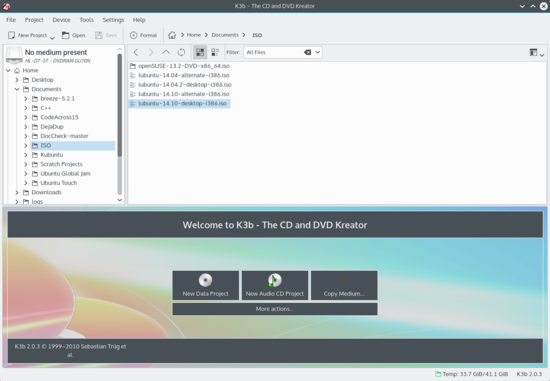 |
Introduction
If you have used a burning program such as Nero under Windows, K3b will feel quite familiar.
Featuring a simple, yet powerful graphical interface, K3b provides various options for burning a CD, DVD, or BD (Blu-ray disc). Various types of optical projects are supported including (but not limited to) audio and data, video projects for DVD and VCD, as well as multi-session and mixed-mode discs. K3b also has the ability to erase re-writeable media and can perform more complicated tasks such as audiovisual encoding and decoding.
Pre-setup
When you run K3b for the first time, you may find K3b informing you that no optical writer drivers have been found, meaning you will not be able to write to any optical discs. There is no need to panic as K3b will open a configuration window which will help you get various tools used by K3b up and running. This includes viewing the user group that owns those applications. You shouldn't need to change this as K3b will apply the correct permissions on external programs itself. These programs are generally cdrecord, growisofs and cdrdao. If preferred, one can tell K3b to use the burning user group and point it to the optical drive. Below is an image of the configuration window where these settings are possible.
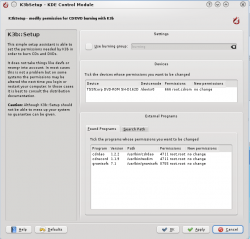
Configuring the User Interface
Upon starting K3b you are offered quick starts to the three most popular processes
- New Data Project
- New Audio CD Project
- Copy Medium
K3b can perform much more than these tasks though, and so you may find that some of the other possibilities are just as useful to you. Take a look at this list for a taste of other available functions (click on the image to enlarge it):
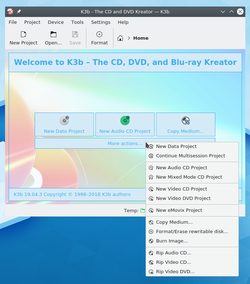
Perhaps a quick start for one or more of these other tasks would be useful to you and so K3b can give you that, too. Simply right click on the application desktop, and here you will see a menu for adding buttons:
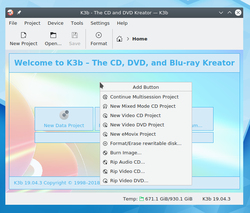
Configuring the internals
Most of the default settings can simply be left alone. It is however, recommended that you do take a look at the Advanced Settings page. Here you can set various important settings, if required.
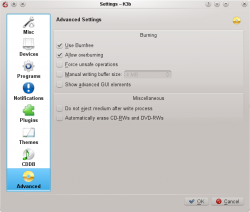
- Use Burnfree should be set - it controls the burn, ensuring that the buffer never gets dangerously low (which reduces the quantity of bad burns).
- You may wish to automatically erase re-writable disks.
- The option Do not eject medium after write process is invaluable if your drive is one that cannot be closed quickly enough for Verify to happen.
Preparing to burn a disk
When starting a new project, you should ensure that K3b has detected the correct optical media, such as CD or DVD. On the status line at the bottom of the screen you should see the size of disk which is currently set. If this is not correct, or you require a different size, simply right-click on it and set the preferred size from the provided list:
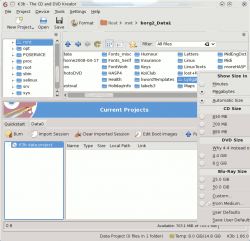
All that's left to do now, is choose what is to be burned. The top half of the screen functions like a file manager. Simply drag and drop the files and directories you wish to burn onto the large pane at bottom right. On the left you will see a tree view forming of your chosen files. Should there be some files or directories which you do not want to burn, these can be easily removed from the project by simply removing them from the panel at the bottom. Select the file to be removed (you can control-click to select multiple ones), then right-click, and select Remove. After this, the bottom left-hand panel should show an updated tree representation of the directories and files.
The top line will be the title of the disk. In many cases this will be fine, but if you would like to change this to something else, simply right-click on the title and rename it.
Final Steps
You are now ready to hit the Burn button.
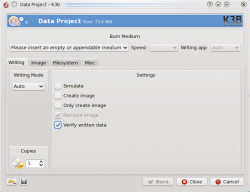
You will see on my screenshot that no disk was present. When you have inserted the appropriate disk you will see a description of it on that line.
There are still one or two choices to be made. I would recommend that you set Verify written data, then hit the Save icon at the bottom of the screen, ensuring that it becomes your personal default. For most modern drives it's safe to leave mode and speed to Auto. If you may wish to burn another copy of the disk at a later date, select Create image, which will save having to set up the burn again. Set the number of copies you want to burn, then, when you are satisfied, hit Burn.
Burning an Audio CD
This page tells you how to burn an audio CD from your stored files.
